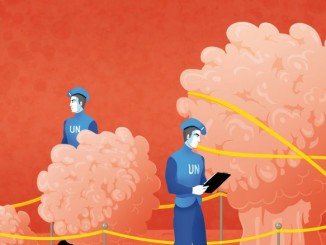No doubt that diet, as part of a healthy lifestyle, is a pillar of disease prevention and wellbeing, but judging the evidence and coming to strong recommendations in the field is a challenging issue, even for the experts
In 2018 the Third Expert Report – Diet, Nutrition, Physical Activity and Cancer: a Global Perspective was published by the World Cancer Research Fund/American Institute for Cancer Research (WCRF/AICR. Continuous Update Project Expert Report 2018). “The continuous update project is now the most authoritative statement on the relationship between diet, nutrition, physical activity and the prevention and management of cancer” said Martin Wiseman, medical and Scientific adviser, WCRF, in a video (About Continuous Update Project (CUP) 2018) presenting the latest Expert Report, a comprehensive analysis since 1997 of the worldwide body of research available. “The amount of literature published in this area is considerable. Each cancer site is reviewed and, as soon as we finish reviewing that cancer site, the WCRF publishes the statements about that cancer site based upon the most up to date information” added Alan Jackson, Professor Emeritus, University of Southampton, in the same video. Moving from raw data toward final recommendations, the process beyond this kind of analysis is really long and complicated but, at the end of the day, can lead to evidence-based advice for people, physicians and policymakers that should work together to reduce the global burden of cancer.

Two questions, plenty of answers
Cancer accounts for one in eight deaths worldwide and is the leading cause of death in many countries. Moreover, the burden of cancer is expected to increase to 21.7 million cases and 13 million deaths by 2030, with a growing number of cancer survivors (WCRF/AICR. Continuous Update Project Expert Report 2018; Lancet. 2018 Mar 17;391(10125):1023-75). The good news is that 30 to 50 per cent of all cases could be prevented and that dietary modification is an important approach to cancer control (WHO – Cancer prevention). “Evaluating the link between nutrition and cancer, the first question is about the role of foods and nutrients in the disease prevention among healthy individuals” said Elio Riboli, Chair in Cancer Epidemiology and Prevention at Imperial College London and Coordinator of the European Prospective Investigation into Cancer and Nutrition (EPIC) study (EPIC Study), jointly with Marc Gunter and Paul Brennan at the International Agency for Research on Cancer in Lyon (IARC), France. “Thousands of studies focused on this topic in the past decades and we can now draw evidence-based recommendations for almost every type of cancer” he added, highlighting that going beyond the plate to a more general healthy lifestyle (including for example physical activity) is the key to maximize the benefits. “At this point of the journey, we really need to extend our view in order to include cancer survivors in our research” Riboli stated. He firmly believes that time has come to answer the second big question in the field: which is the role of nutrition (together with physical activity and anthropometric measures) in patients already diagnosed with cancer? For the first time, the WCRF/AICR Third Expert Report includes a whole section on Cancer survivorship (WCRF/AICR. Continuous Update Project Expert Report 2018) showing that in breast cancer patients body fatness is linked to an increased risk even after the first diagnosis. “WCRF classified the evidence as ‘limited’, nonetheless I think this is a very important first step in a new area. We are now at the very beginning of a big change and I’m really confident about the possibility of obtaining convincing results in the next few years” Riboli concluded.
Mind the data!
Judging the evidence to obtain a general recommendation is very complicated when looking at the link between nutrition and cancer. Different institutions/agencies use specific protocols to analyse data and to classify or communicate their results, but probably none of them could perfectly overcome all the challenges encountered in the field. As a matter of fact, the quality of data is the first big problem scientists face, owing to the observational nature of the majority of evidence on nutrition and diet. Experts agree that attributing causality is challenging if the starting point is an observational study: randomized controlled trials (RCT) may yield more powerful results, but they are not always suitable for addressing questions on the role of nutrition in cancer. “It requires high-quality epidemiological data (i.e., large prospective studies with detailed information on potential confounding factors), mechanistic data from in vivo/animal models and cell studies and other approaches such as biomarker-based and genetic studies. To come to a conclusion and make sound recommendations needs a triangulation of these different types of evidence and the WCRF panel makes a good job as do the IARC team in their monographs” said Marc Gunter (IARC monographs), Head, Section of Nutrition and Metabolism at IARC, Lyon. As described in the Third Expert Report, the WCRF/AICR Cancer Prevention Recommendations are derived from systematic reviews of epidemiological evidence, supported by experimental evidence from human and animal studies. “Moreover, to move properly from association to causation, approaches that could limit bias are mandatory” added Gunter. For example, the Bradford Hill criteria (Bulletin of the World Health Organization 2005;83(10)) are the basis for the Continuous Update Project (CUP) systematic review analyses and the criteria for judging the evidence by WCRF/AICR.
What do you mean by fibres?
In addition to the study design, many other issues should be taken into account when interpreting epidemiological evidence, as highlighted in the WCRF/AICR Third Expert Report (WCRF/AICR. Continuous Update Project Expert Report 2018). First, the vast majority of epidemiological studies are carried out in high-income countries and results may have limited relevance to people living where dietary patterns are different. Moreover, quantitative measurements of dietary exposure could be difficult to assess and thus are often taken imprecisely, always keeping in mind that it’s easier to measure intakes in terms of foods than in terms of constituent of a food. And don’t forget that even terminology could be an issue, because for some exposure there is no agreement on definition. You can state that dietary fibres can help prevent some cancers, but this definition (i.e. dietary fibres) disguises the fact that different types of fibres can lead to different outcomes. Finally, what about the longstanding debate on single nutrient vs food vs dietary pattern? As reported in the WCRF/AICR Third Expert Report “dietary constituents are often clustered within foods and patterns of diet are linked to other health-related behaviours” and because the total is more (or, at least, is different) than the sum of its parts, it’s worth asking whether is better to study a single nutrient or moving to a whole dietary pattern. Even if this is just a small part of a much longer list of issues, sometimes very hard to be addressed, there’s a growing body of evidence suggesting that general recommendations from WCRF/AICR Reports or other dietary guidelines do work in real life (Cancer Prev Res (Phila). 2014;7:42-53; Am J Clin Nutr 2012; 96(1): 150–163; Cancer Epidemiol Biomarkers Prev 2016; 25: 1018–28 ) and that benefits of following these advice goes beyond cancer and extends to other non-communicable diseases.
General advice vs personalized nutrition
Is it still worthy of giving “one-fits-all” recommendations in the era of personalised medicine and nutrition? Results from several studies suggest that a personalized approach could be more effective than traditional generic strategies: as recently shown in the Food4Me randomized-controlled trial, personalised nutritional advice delivered by internet lead to a larger and more appropriate effect on changing dietary habits than the conventional approach among European adults (Int J Epidemiol. 2017 Apr 1;46(2):578-588). “Nutrition recommendations need to be patient-centred to achieve success” wrote Fang Fang Zhang, Associate Professor at the Tufts University Friedman School of Nutrition Science and Policy, Boston, Massachusetts, in a perspective note (Oncology. 2018 Nov 15;32(11):542-7). “Currently, we are not in a position to make personalized recommendations based on sound scientific evidence” Gunter said. “Certainly we know there are differences among individuals in how they metabolise nutrients and foods, and it is plausible that this could impact the effect of a particular diet/nutrient on cancer risk, but this really needs large-scale robust studies that can stratify by genetics, metabolic variation and much more” he added. As experts say, general recommendations are likely to be relevant for everyone even if it’s possible that some may benefit more than others (BMJ. 2018 Jun 13;361:bmj.k2173).
Use the right words, please
Shortly after the publication of IARC Monograph (Volume 114) on Evaluation of consumption of red meat and processed meat (Lancet Oncol. 2015 Dec;16(16):1599-600; IARC Monograph Vol 114), the British science journalist Ed Yong wrote that experts from the International Agency of Research into Cancer (IARC) “are terribleat communicating their findings”. Yong’s main complaint was about the categories used by IARC to classify the cancer risk factors, which he describes as too obscure for a non-specialised audience: “Perhaps we need a separate classification scheme for scientific organizations that are ‘confusogenic to humans’” added the author in his provocative text published on The Atlantic. Beyond this challenge issued by Yong, it’s true that when it comes to disseminating results of scientific research in a fiddly field like “nutrition and cancer”, spreading of misleading information it’s not so uncommon. “Processed meats rank alongside smoking as cancer causes” was written on The Guardian about IARC results on the effect of red meat and processed meat consumption on cancer risk. Such a headline – although not formally wrong – could lead many people to ban red meat from their plate, which is not consistent with experts’ recommendations. “This is an important point” commented Marc Gunter from IARC. “I think we all have a big responsibility in communicating science effectively: as scientists, we need to convey our findings, as well as potential limitations, in a clear and understandable way. On the other hand, the media need to avoid over-sensationalising findings andshouldreport results in a balanced way” he said.
What’s next?
Although much is already known about the impact of diet on cancer risk, many questions are still open. In the third WCRF/AICR report Continuous Update Project Expert Report 2018, experts identify six areas where research is needed:
- Biological mechanisms by which diet, nutrition and physical activity affect cancer processes.
- The impact of diet, nutrition and physical activity throughout the life course on cancer risk.
- Better characterisation of diet, nutrition, body composition and physical activity exposures.
- Better characterisation of cancer-related outcomes.
- Stronger evidence for the impact of diet, nutrition and physical activity on outcomes in cancer survivors.
- Globally representative research on specific exposures and cancer.
“There are many open fields of research like identification of more accurate ways of measuring diet; discovery of robust biomarkers of diet; evaluation of the interaction between diet and microbiome. The issues of processed foods, as well as food contaminants (e.g. pesticides), are also likely to be tackled in the coming years” added Marc Gunter.
Bridging the gap
Traditionally, epidemiologists have looked at the healthy population trying to identify new risk factors and approaches for prevention, while physicians and clinical oncologists have focused on disease management. “it’s like being on two different sides of the same mountain. We now need a sort of cultural revolution to let the experts meet” commented Riboli, adding that the growing interest for cancer survivorship could be a big trigger for this revolution. “Collaboration and multidisciplinary teams are mandatory as demonstrated by Clinical Studies Groups from National Cancer Research Institute, UK. The CSGs bring together clinicians, scientists, statisticians and lay representatives to coordinate development of a strategic portfolio of trials within their field” he concluded.





